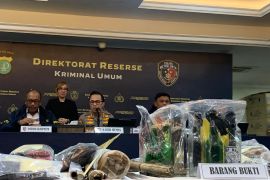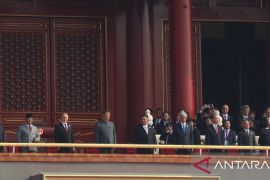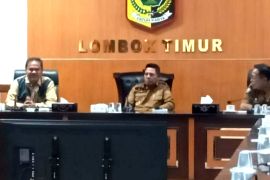Orangutan is the only species of great apes in Asia. Three other species of great apes, Gorilla (Gorilla gorilla), Chimpanzee (Pan troglodytes), and Bonobo (Pan panicus), all live in Africa.
There are only two orangutan species, namely Sumatra orangutans (Pongo abelii) which inhabit forests on Sumatra Island, and Borneo orangutans (Pongo Pygmaeus) which can be found on Kalimantan/Borneo Island.
It is estimated that around 50,000 to 60,000 orangutans are still living in the wild, 80 percent of them in Indonesia and the rest in Malaysia.
But not all orangutans live freely in their habitats, as quite many of these endangered and rare animals are being locked up in cages, either in zoos, or as pets, or actors in orangutan shows.
Many people find them smart, cute, adorable and funny, but still they don`t belong in circus shows, they must be returned to their habitats in the wild.
At least that`s what Indonesian Forestry Minister Zulkifli Hasan and NGOs like Borneo Orangutan Survival Foundation (BOSF) believe.
On Monday (Feb 27), the minister symbolically presented four orangutans to the foundation for release into the Bukit Batingkap protected forest area in Murung Jaya District, Central Kalimantan Province, on the next day (Feb 28).
"The four orangutans to be released are part of 40 orangutans planned to be put back into the wild in 2012 by BOS Foundation," Minister Hasan said at Tjilik Riwut airport, Palangkaraya, Central Kalimantan.
The lucky orangutans due to be released into freedom are Tarzan, Monic, Astrid and Tantri. They were put in the rehabilitation center before being released into the forest.
The forestry ministry remains committed to preserving and allocating forest area for restoring the ecosystem including for orangutan habitat.
"Orangutans must be saved and be released into the wild," he said urging all parties to help the BOSF in preserving orangutans.
Co-operation among NGOs, businessmen, and the government is essential to help rehabilitate forest areas, he added.
It was very normal for forestry companies to help preserve orangutans and forests, he stated.
Sharing the minister`s view, the chairman of the BOSF`s Board of Trustees , Prof Dr Bungaran Saragih, said in Palangkaraya on Monday (Feb 27) that in the past it was believed that only NGOs could save orangutans.
Now, it was realized that NGOs alone could not save orangutans, said Saragih. NGOs need the cooperation of the government and the private sector to protect orangutans, he stated.
Orangutans are protected by the state and based on the existing law, those killing orangutans could be jailed for five years.
At present, their habitats are shrinking because rainforests are cleared for the opening of plantations. Orangutans are often slaughtered as they venture into these plantations in search for food, while their babies are torn from their arms and often sold into the illegal pet trade.
The Center for Orangutan Protection (COP) last February 18, 2012 said orangutans continue to be targeted by hunters in East Kalimantan.
The recent discovery of a wounded orangutan in East Kutai district was proof that the near-extinct and protected mammal was still being hunted and slaughtered Arfiana Khairunnisa, COP manager for Kalimantan, said.
"We ask the law enforcing agencies to investigate how the orangutan came to be injured and who was responsible," she said.
According to a survey conducted in 2009 by Yaya Rayadin, a researcher with Mulawarman University in Samarinda, the orangutan population in the Kutai National Park was about 2,000.
BOSF has been working to rescue and rehabilitate orangutans at its Nyaru Menteng Rescue and Rehabilitation Centre in Central Kalimantan, which has more than 600 orangutans in its care - ranging in age from a few months to approximately 8 years.
The NGO plans to release all of the 612 orangutans into Central Kalimantan forests in the coming years. All orangutans living in rehabilitation centers should be released back to their habitats by 2015, at the latest, said Saragih.
The plan to release orangutans, however, must be supported by providing adequate forest area for their habitat, Saragih said.
The total area needed to accommodate the orangutans is around 123,00 hectares. For this purpose, a proposal has been submitted to the Murung Raya district head, Central Kalimantan.
The last time BOSF released orangutans into the wild was nine years ago, due to a lack of safe forest area for their habitat.
Now, thanks to the protected forest area provided by the local authorities, for the first time, BOSF can release 40 orangutans into the wild.
BOSF plans to again return 12 orangutans to their habitat in late March 2012.
Besides those in Central Kalimantan, BOSF also rehabilitates 226 orangutans in the East Kalimantan Orangutan Reintroduction Program at Samboja Lestari.
In April 2009, BOSF established PT Indonesian Orangutan Habitat Restoration Conservation (PT. RHOI), a national private company in order to realize the commitment in managing and utilizing forest for ecosystem restoration to release back orangutans into their natural habitats.
BOSF`s Board of Trustees and Board of Directors paid a courtesy call to the Ministry of Forestry in April 2010, and discussed the plan to release orangutans back to their natural habitat.
Minister Zulkifli Hasan supported the plan and later proved his intention by issuing Minister of Forestry�s Decree Number: SK/464/MENHUT-II/2010 dated August 18th, 2010 on "Granting Rights to Wood Utilisation of Natural Forest Ecosystem Restoration To PT Restorasi Habitat Orangutan Indonesia, on the 86,000 hectares of Production Forest Area in East Kutai and Kutai Kartanegara Regency, East Kalimantan".
A recent study concludes that protecting orangutans can become a solution to counter climate change because it promotes the preservation of tropical forests, which is the orangutans` habitat and a major contributor of oxygen.
"The conservation of orangutans is a way to protect the forest as it provides habitat for orangutans, whose population is dwindling," Deputy Director of PT RHOI Aldrianto Priadjati said recently on the sidelines of the Asian Forum on Carbon Update 2012.
By freeing orangutans in the tropical forest, it will help preserve the forest, which is producing oxygen for the Earth, he said.
"There should be a common understanding that Indonesia`s forests are crucial, not only to produce timber but also to provide solutions to address climate change," Aldrianto said. (*)
Reporter: Fardah
Editor: Fardah Assegaf
Copyright © ANTARA 2012











